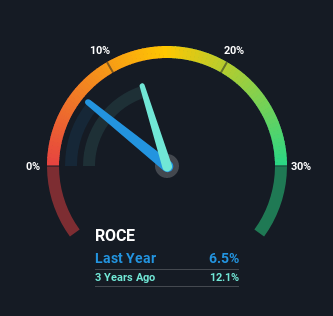Origin Enterprises (ISE:OIZ) Is Reinvesting At Lower Rates Of Return

There are a few key trends to look for if we want to identify the next multi-bagger. Ideally, a business will show two trends; firstly a growing return on capital employed (ROCE) and secondly, an increasing amount of capital employed. Put simply, these types of businesses are compounding machines, meaning they are continually reinvesting their earnings at ever-higher rates of return. However, after briefly looking over the numbers, we don't think Origin Enterprises (ISE:OIZ) has the makings of a multi-bagger going forward, but let's have a look at why that may be.
Understanding Return On Capital Employed (ROCE)
For those that aren't sure what ROCE is, it measures the amount of pre-tax profits a company can generate from the capital employed in its business. Analysts use this formula to calculate it for Origin Enterprises:
Return on Capital Employed = Earnings Before Interest and Tax (EBIT) ÷ (Total Assets - Current Liabilities)
0.065 = €39m ÷ (€1.1b - €495m) (Based on the trailing twelve months to January 2021).
So, Origin Enterprises has an ROCE of 6.5%. On its own, that's a low figure but it's around the 8.0% average generated by the Food industry.
See our latest analysis for Origin Enterprises

In the above chart we have measured Origin Enterprises' prior ROCE against its prior performance, but the future is arguably more important. If you'd like to see what analysts are forecasting going forward, you should check out our free report for Origin Enterprises.
What The Trend Of ROCE Can Tell Us
When we looked at the ROCE trend at Origin Enterprises, we didn't gain much confidence. To be more specific, ROCE has fallen from 13% over the last five years. On the other hand, the company has been employing more capital without a corresponding improvement in sales in the last year, which could suggest these investments are longer term plays. It's worth keeping an eye on the company's earnings from here on to see if these investments do end up contributing to the bottom line.
On a separate but related note, it's important to know that Origin Enterprises has a current liabilities to total assets ratio of 45%, which we'd consider pretty high. This effectively means that suppliers (or short-term creditors) are funding a large portion of the business, so just be aware that this can introduce some elements of risk. While it's not necessarily a bad thing, it can be beneficial if this ratio is lower.
What We Can Learn From Origin Enterprises' ROCE
To conclude, we've found that Origin Enterprises is reinvesting in the business, but returns have been falling. And investors appear hesitant that the trends will pick up because the stock has fallen 29% in the last five years. Therefore based on the analysis done in this article, we don't think Origin Enterprises has the makings of a multi-bagger.
On a final note, we've found 4 warning signs for Origin Enterprises that we think you should be aware of.
While Origin Enterprises isn't earning the highest return, check out this free list of companies that are earning high returns on equity with solid balance sheets.
If you're looking for stocks to buy, use the lowest-cost* platform that is rated #1 Overall by Barron’s, Interactive Brokers. Trade stocks, options, futures, forex, bonds and funds on 135 markets, all from a single integrated account. Promoted
If you're looking to trade Origin Enterprises, open an account with the lowest-cost platform trusted by professionals, Interactive Brokers.
With clients in over 200 countries and territories, and access to 160 markets, IBKR lets you trade stocks, options, futures, forex, bonds and funds from a single integrated account.
Enjoy no hidden fees, no account minimums, and FX conversion rates as low as 0.03%, far better than what most brokers offer.
Sponsored ContentNew: AI Stock Screener & Alerts
Our new AI Stock Screener scans the market every day to uncover opportunities.
• Dividend Powerhouses (3%+ Yield)
• Undervalued Small Caps with Insider Buying
• High growth Tech and AI Companies
Or build your own from over 50 metrics.
This article by Simply Wall St is general in nature. It does not constitute a recommendation to buy or sell any stock, and does not take account of your objectives, or your financial situation. We aim to bring you long-term focused analysis driven by fundamental data. Note that our analysis may not factor in the latest price-sensitive company announcements or qualitative material. Simply Wall St has no position in any stocks mentioned.
*Interactive Brokers Rated Lowest Cost Broker by StockBrokers.com Annual Online Review 2020
Have feedback on this article? Concerned about the content? Get in touch with us directly. Alternatively, email editorial-team (at) simplywallst.com.
About ISE:OIZ
Origin Enterprises
Provides agronomy services company in Ireland, the United Kingdom, Brazil, Poland, Romania, Latin America, and internationally.
Very undervalued with solid track record.
Market Insights
Community Narratives



